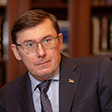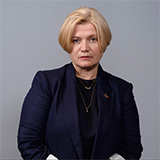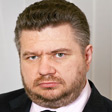British Prime Minister Gordon Brown on "Russian Aggression"
This is how we will stand up to Russia's naked aggression
Twenty years ago, as the Berlin Wall fell, people assumed the end of hostility between East and West, and a new world order founded on common values. As part of this, 10 Eastern European states joined Nato and intensified co-operation with Europe and more wanted to follow. But Russia's hostile action towards Georgia suggests that they are unreconciled to this new reality. Their aggression raises two urgent questions for us: how best to stabilise Georgia now, and how to make it clear to Russia that its unilateral approach is dangerous and unacceptable. War in Georgia also poses a serious longer term issue – how can we best create a rules-based international system that protects our collective security and safeguards our shared values?
This is how we will stand up to Russia's naked aggression
As European leaders meet, the Prime Minister says security is linked to the politics of energy
Gordon Brown
The Observer,
Sunday August 31 2008
Twenty years ago, as the Berlin Wall fell, people assumed the end of hostility between East and West, and a new world order founded on common values. As part of this, 10 Eastern European states joined Nato and intensified co-operation with Europe and more wanted to follow. But Russia's hostile action towards Georgia suggests that they are unreconciled to this new reality. Their aggression raises two urgent questions for us: how best to stabilise Georgia now, and how to make it clear to Russia that its unilateral approach is dangerous and unacceptable. War in Georgia also poses a serious longer term issue – how can we best create a rules-based international system that protects our collective security and safeguards our shared values?
At tomorrow's European summit in Brussels we will first unite to alleviate the suffering of the 100,000 Georgian civilians left without homes. The UK has already pledged £2m, and I will urge partners to meet not only Georgia's immediate needs but its long-term reconstruction and development needs. We will deploy peace monitors to better judge violations of the ceasefire, appoint a senior figure to drive the humanitarian and political effort, and support the Nato Georgia Commission, with a Nato team sent to Georgia.
Georgia has felt the consequences of the conflict. It is important that the summit also demonstrates to Russia that its actions have real consequences.
No one wants a new Cold War or the encirclement of Russia. But when I spoke to President Medvedev yesterday, I told him to expect a determined European response. As David Miliband has said, there can be no return to 'business as usual' unless and until Russia commits fully to Georgia's territorial integrity and withdraws to its previous positions.
Russia has emerged as a significant economic power, with its trade increasing fourfold. It has done so by reaping the benefits of a stable global order based on agreements that make trade and investment both possible and profitable, bringing greater stability and certainty to international relations. Equally, when Russia fights secessionist movements in Chechnya or Dagestan, it expects others to respect its territorial integrity and not to recognise declarations of independence.
So when Russia has a grievance over an issue such as South Ossetia, it should act multilaterally by consent rather than unilaterally by force. I believe Russia faces a choice about the nature of its responsibilities as a leading and respected member of the international community. My message to Russia is simple: if you want to be welcome at the top table of organisations such as the G8, OECD and WTO, you must accept that with rights come responsibilities. We want Russia to be a good partner in the G8 and other organisations, but it cannot pick and choose which rules to adhere to.
That is why I will argue tomorrow that Russia should accept Georgia's territorial integrity and international mechanisms for addressing these conflicts, and withdraw troops to their previous positions. And, in the light of Russian actions, the EU should review – root and branch – our relationship with Russia. We should continue to strengthen the transatlantic relationship and may need to meet more regularly as the G7. We are also reflecting on the Nato response. We must re-evaluate the alliance's relationship with Russia, and intensify our support to Georgia and others who may face Russian aggression.
No nation can be allowed to exert an energy stranglehold over Europe and the events of August have shown the critical importance of diversifying our energy supply. The tenfold increase in the world oil price in the past decade has demonstrated that diversification from oil is also an economic necessity. The UK will go from being 80 per cent self-sufficient now to having to import almost two-thirds of our gas and more than half of our oil by 2020 – precisely as markets become more volatile as more people chase fewer natural resources. And with states such as Russia increasingly using their energy resources as policy tools it is apparent that the security grounds for this shift are stronger as well.
Without urgent action we risk sleepwalking into an energy dependence on less stable or reliable partners. That is why we in the UK are putting in law our commitment to cut CO2 emissions by 60 per cent by 2050, looking to replace our ageing nuclear power plants, to encourage greener fuels to power our homes and businesses and to transform the way we travel. Europe also needs to take action. Tomorrow's summit must add urgency to the work on Europe's energy agenda. We must more rapidly build relationships with other producers of oil and gas. Our response must include a redoubling of our efforts to complete a single market in gas and electricity, a collective defence to secure our energy supplies.
I will also be pressing European leaders to increase funding for a project to allow us to source energy from the Caspian Sea, reducing our dependence on Russia. I will encourage European partners to use our collective bargaining power rather than seek separate energy deals with Russia. And because the environmental necessity is urgent, we must deliver an ambitious 2020 climate and energy package by the end of this year.
More than 10 years ago Alexander Solzhenitsyn – who died just days before this latest chapter in the history of his country – wrote: 'We were recently entertained by a naive fable of the happy arrival of the end of history, of the overflowing triumph of an all-democratic bliss; the ultimate global arrangement had supposedly been attained. But we all see and sense that something very different is coming, something new, and perhaps quite stern. No, tranquillity does not promise to descend on our planet, and will not be granted us so easily.' The past few days have seen some of his predictions realised.
This is why the changing global order cannot be governed by institutions designed in the middle of the last century. We now know how much more we have to do to create an effective system of international rules. We must strengthen the system of global governance to meet the challenges of our interdependent world. We must reshape our global architecture to meet the new challenges: climate change, energy security, poverty, migration. And in doing so we must stand up for both our vital interests and our essential values.
Ukraine, Russia and European stability
It is not an act of hostility towards Russia for Europe to support Ukraine, but a positive move towards lasting peace
David Milliband
The Guardian
Friday August 29 2008
Since the collapse of the Soviet Union, it has seemed that new rules were being established for the conduct of international relations in central and eastern Europe and central Asia. The watchwords were independence and interdependence; sovereignty and mutual responsibility; cooperation and common interests. They are good words that need to be defended.
The Georgia crisis provided a rude awakening. The sight of Russian tanks in a neighbouring country on the 40th anniversary of the crushing of the Prague Spring has shown that the temptations of power politics remain. The old sores and divisions fester. Russia remains unreconciled to the new map of Europe.
Yesterday's unilateral attempt to redraw the map marks not just the end of the post-cold war period, but is also the moment when countries are required to set out where they stand on the significant issues of nationhood and international law.
The Russian president says he is not afraid of a new cold war. We don't want one. He has a big responsibility not to start one.
Ukraine is a leading example of the benefits that accrue when a country takes charge of its own destiny, and seeks alliances with other countries.
Its choices should not be seen as a threat to Russia or an act of hostility. Equally its independence does demand a new relationship with Russia – a partnership of equals, not the relationship of master and servant.
Russia must not learn the wrong lessons from the Georgia crisis: there can be no going back on fundamental principles of territorial integrity, democratic governance and international law. It has shown in the last two weeks what anyone could have foretold: that it can defeat Georgia's army. But today Russia is more isolated, less trusted and less respected than two weeks ago. It has made military gains in the short term. But over time it will feel the economic and political losses. If Russia truly wants respect and influence, and the benefits that flow from it, Russia needs to change course.
Prime Minister Putin has described the collapse of the Soviet Union as "the greatest geopolitical catastrophe" of the 20th century. I don't see it that way. Most people of the former Soviet bloc or Warsaw Pact don't see it that way. It will be a tragedy for Russia if it spends the next 20 years believing it to be the case.
Indeed, since 1991 there has been no "stab in the back" of Russia. In fact, we have offered Russia extensive cooperation with the EU and Nato; membership of the council of Europe and the G8. Summits, mechanisms and meetings have been developed by the EU and Nato not to humiliate or threaten Russia, but to engage with it. The EU and the United States provided critical support for the Russian economy when it was needed, and western companies have invested heavily. And Russia has made substantial gains from its reintegration into the global economy.
These are actions that seek to promote prosperity and respect for Russia. But they have recently been met with scorn. Indeed, the record from suspension of Russian participation in the conventional armed forces to harassment of business people and cyber attacks on neighbours is not a good one. Now we have Georgia.
People often talk and ask about unity in Europe. Russian action has produced unity in Europe. Unity in demanding the withdrawal of Russian troops to their August 7 positions; unity in rejecting the use of force as the basis for redrawing the map of the Caucasus; unity in support of the democratically elected government of Georgia.
Of course Russia can and should have interests in its neighbours, but like everyone else, it must earn that influence. Indeed, they do not make up the "post-Soviet space" to which Prime Minister Putin often refers. The collapse of the Soviet Union created a new reality – sovereign, independent countries with minds of their own and rights to defend.
Russia also needs to clarify its attitude to the use of force to solve disputes. Some argue that Russia has done nothing not previously done by Nato in Kosovo in 1999. But this comparison does not bear serious examination.
Leave to one side that Russia spends a lot of time arguing in the UN and elsewhere against "interference" in internal affairs, whether in Zimbabwe or Burma. Nato's actions in Kosovo followed dramatic and systematic abuse of human rights, culminating in ethnic cleansing on a scale not seen in Europe since the second world war. Nato acted over Kosovo only after intensive negotiations in the UN security council and determined efforts at peace talks. Special envoys were sent to warn Milosevic in person of the consequences of his actions. None of this can be said for Russia's use of force in Georgia.
The decision to recognise Kosovo's independence came only after Russia made clear it would veto the deal proposed by the UN secretary general's special envoy, former Finnish President Ahtisaari. Even then we agreed to a further four months of negotiations by an EU-US-Russia troika in order to ensure that no stone was left unturned in the search for a mutually acceptable compromise.
Over Georgia, Russia moved from support for territorial integrity to breaking up the country in three weeks and relied entirely on military force to do so.
Russia must now ask itself about the relationship between short-term military victories and long-term economic prosperity. At the time of the Soviet Union's invasion of Hungary in 1956 or Czechoslovakia in 1968, no one asked what impact its actions had on the Russian stock market. There was no Russian stock market.
Now, the conflict in Georgia has been associated with a sharp decline in investor confidence. Russia's foreign exchange reserves fell in one week by $16bn. In one day the value of Gazprom fell by the same amount. Risk premia in Russia have sky-rocketed.
Isolation of Russia is not feasible. It would be counter-productive because Russia's economic integration is the best discipline on its politics. It would only strengthen the sense of victimhood that fuels intolerant nationalism. And it would compromise the world's interests in tackling nuclear proliferation, addressing climate change or stabilising Afghanistan.
But the international community is not impotent. Europeans need Russian gas, but Gazprom needs European consumers and investment. The reality of interdependence is that both sides have leverage; both sides can change the terms of trade.
Our approach must be hard-headed-engagement. That means bolstering allies, rebalancing the energy relationship with Russia, defending the rules of international institutions, and renewing efforts to tackle "unresolved conflicts".
Here, Ukraine is key. It has strong links to Russia and this is firmly in both countries' interests. But Ukraine is also a European country. Ukrainian leaders have spoken of their aspiration to see their country become a member of the EU. Article 49 of the EU treaty gives all European countries the right to apply. The prospect and reality of EU membership has been a force for stability, prosperity and democracy across eastern Europe and it should remain so beyond. Once Ukraine fulfils EU criteria, it should be accepted as a full member.
As for Ukraine's relationship with Nato, it does not pose a threat to Russia. It is about strengthening Ukraine's democratic institutions and independence – things that will benefit Russia in the long term.
Europe also must re-balance the energy relationship with Russia. Europe needs to invest in storing gas to deal with interruptions. More interconnections between countries and properly functioning internal markets will increase resilience. It needs diverse, secure and resilient gas supplies.
Europe needs to act as one when dealing with third parties like Russia. And we will be reducing our dependence on gas altogether: increasing energy efficiency, investing in carbon capture and storage technology for coal, and in renewables and nuclear power.
In all international institutions, we will need to review our relations with Russia. I do not apologise for rejecting kneejerk calls for Russia to be expelled from the G8, or for EU-Russia or Nato-Russia relations to be broken. But we do need to examine the nature, depth and breadth of relations with Russia.
In Nato, we will stand by our commitments to existing members, and there will be renewed determination that there should be no Russian veto on the future direction of Nato.
Fourth, the unresolved conflicts that mark the end of empire should not be ignored. The world's attention is currently on South Ossetia and Abkhazia. But the conflicts in Transnistria and Nagorno-Karabakh must not be overlooked. Each has its roots in longstanding ethnic tensions, exacerbated by economic and political underdevelopment.
The choice today is clear. Not to sponsor a new cold war, but to be clear about the foundations of lasting peace.
Europe must stand up to the Russian bully
By Malcolm Rifkind
The Daily Telegraph, 31/08/2008
"The policy and practice of the Russian Government has always been to push forward its encroachments as fast and as far as the apathy or want of firmness of other Governments would allow it to go, but always to stop and retire when it met with decided resistance."
So said Lord Palmerston during the Crimean crisis 150 years ago. If the United States and Europe are not careful we may end up with a new Crimean War in the not-too-distant future.
European Union leaders, meeting in emergency session in Brussels tomorrow, therefore have an awesome responsibility when deciding on future relations with Russia. They cannot leave it all to Washington. Russia is part of Europe. Russia is Western Europe's neighbour.
Recent events in the Caucasus are not the start of a new Cold War. But Russia's behaviour in Georgia marks the worst deterioration in its relations with the West since the end of the Soviet Union.
Vladimir Putin
Vladimir Putin cannot be allowed to take an imperial line on Russian expansion
However, Russian aggression against Ukraine that would be the deepest crisis for the international community. We are right to back the democratic government of Georgia but our strategic interests in that country are only slightly greater than our interests and support for the struggling people of Zimbabwe or Tibet.
A tough reaction by the United States and Europe over Georgia and South Ossetia is necessary not because changing the frontiers in the Caucasus will directly affect our security but because, if Russia sees the West as weak and indifferent, it will be emboldened to repeat its behaviour in Ukraine – and in Crimea, in particular.
Such a crisis would cause massive instability in Europe. Ukraine is a major country with a frontier with the EU. While it is true that parts of Ukraine – including Crimea – have a largely Russian-speaking population, that is far from unique in Europe.
# News: Brown seeks sanctions against Kremlin plotters
# All the latest news from Georgia
advertisement
Dare I say it, Russian minorities in Ukraine, Latvia or elsewhere are like the Sudeten Germans in pre-war Czechoslovakia.
Demanding the absorption of the Sudeten Germans into the Third Reich was the prelude to the Second World War. Russian-speakers in Crimea are now citizens of Ukraine, and Moscow has no right to control its so-called "near abroad". Nor would it be entitled to demand changes of international boundaries on ethnic or national grounds.
The US and EU must be tough. But can the EU meet such a challenge or must it be left to the US? The Russians are not going to be impressed by rhetoric from Brussels. It was, after all, Stalin who asked "How many divisions has the Pope?"
The truth is that Europe remains terribly weak militarily. Only Britain and France are significant military powers and they are both overstretched, with inadequate defence budgets.
Furthermore, on oil and gas, Europe is deeply divided, with Germany too dependent on Russian gas to be prepared to fight for a really tough European energy policy.
There has also been a disinclination by the EU to consider the use of hard power to achieve political ends. The EU has seen itself as the champion of "soft diplomacy" just as Russia has reverted to its historic role as an expansionist empire.
Washington has few illusions as to what Russia respects; the Europeans are more ambivalent.
So European leaders – not just Britain and France – when they meet tomorrow, must resolve to develop a much more substantial military capability for the difficult years ahead. And they must be willing to share their military experience and capability in a more substantial way. France's stated intention to return to full membership of Nato is very much to be welcomed.
But calling for a tougher European strategy is not the same as saying that Nato membership for Georgia and Ukraine is part of the answer.
I do not doubt that if Georgia had been a member of Nato it is less likely that Russia would have behaved in the way it did. But that is precisely the point. It is less likely; not unlikely nor impossible. For Russia, the Caucasus is a crucial area: vital, as they see it, to their southern security.
The Russians are not naïve. They would have known that the US, Britain and France would not go to war with them to force South Ossetia back into Georgia against the wishes of its own people.
So if Georgia had been a member of Nato, President Saakashvili would have invoked Article 5 and demanded military intervention by the rest of the Alliance. This would have been refused and Nato, and its members, would have responded much as they are doing now.
The real damage, however, would have been to Nato's credibility and to the security of the UK and other European countries, which have relied on Article 5 for over half a century.
A member state would have been attacked without Nato rushing to its defence. Some in the US may be fairly relaxed if Nato becomes more of a political alliance and less of a mutual defence pact. After all it is the US that provides most of the military guarantee.
But for the Europeans, including Britain, the weakening of Article 5 would require major increases in defence expenditure and force the British Government into a more substantial common European defence policy, probably under the EU. This would suit some, but the Conservative party, in particular, must be alert to this risk.
The alternative to Nato membership is not to throw Ukraine or Georgia to the Russian wolves. The main prize they should and can be offered is membership of the EU – bringing economic benefits and greatly increasing their political security. Finland, Austria and Sweden are no less secure from Russian aggression than Lithuania or Latvia, despite not being members of Nato.
In any event, in a real crisis, Nato is able to intervene with military force if it wishes to do so, even on behalf of non-members. This is what it did, rightly or wrongly, in Kosovo. The difference is that Nato had choice. It had no treaty obligation.
So Europe must be tough but also realistic with Russia. Putin – who remains the real power in the country – is no new Lenin waging ideological war. He is more like a 19th-century tsar trying to extend Russian power, like all tsars since Ivan the Terrible.
It is not the end of history, but the Russians must be made to realise it is the end of empire.
# Sir Malcolm Rifkind is MP for Kensington and Chelsea and was foreign secretary and defence secretary, 1992-97







